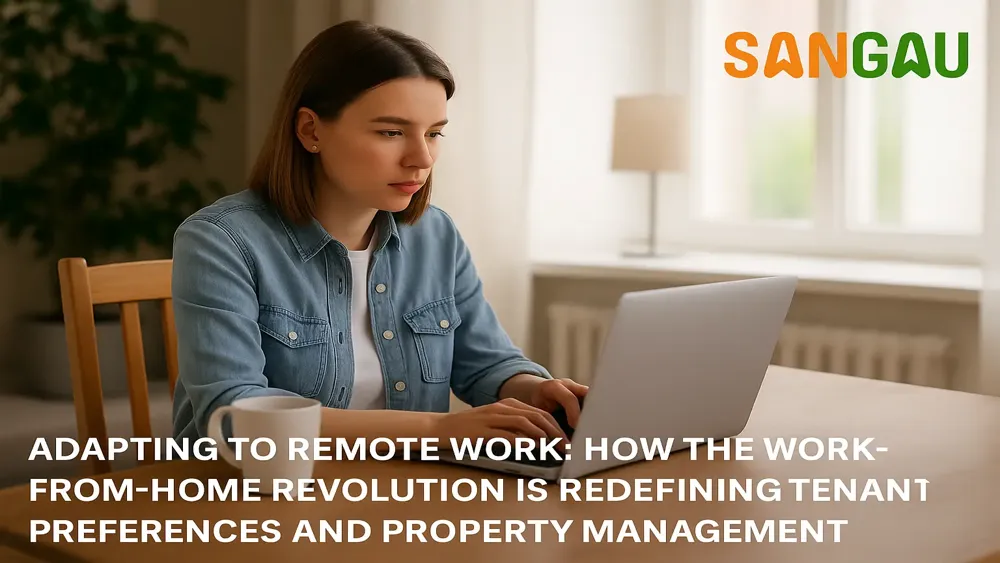Adapting to Remote Work - How the Work-from-Home Revolution is Redefining Tenant Preferences and Property Management
Published : 25 Jun 2025

Adapting to Remote Work: How the Work-from-Home Revolution is Redefining Tenant Preferences and Property Management
The rise of remote work has undeniably transformed the real estate landscape. With more individuals than ever working from home, tenant preferences and property management strategies are undergoing a rapid evolution. For landlords, property managers, and tenants alike, grasping these changes is paramount to staying ahead of the curve.
The Remote Work Revolution: What’s Changing and Why It Matters
The shift to remote work has accelerated significantly in recent years. As companies embrace the flexibility of working from home, the traditional 9-to-5 office job is becoming obsolete. This evolution means tenants now seek homes that support both their personal lives and professional productivity. Property managers face a new set of expectations, with remote workers having specific needs that differ from traditional renters. Understanding and meeting these demands is now essential.
The Growing Demand for Dedicated Home Workspaces
A significant change in tenant preferences is the increased demand for dedicated workspaces. With remote work becoming a permanent fixture, tenants require homes that accommodate both their personal and professional lives. A small desk in the living room is no longer sufficient; remote workers desire quiet, functional areas for optimal productivity. Property managers must emphasise properties offering these features, such as spare bedrooms, built-in desks, or flexible spaces.
Fast Connectivity and Smart Technology: Non-Negotiables in Today’s Market
Reliable high-speed internet has transitioned from a luxury to a necessity in our hyper-connected world. Remote workers require stable and fast internet to stay connected with colleagues, clients, and the digital world. Property managers should prioritise properties with high-speed internet and consider investing in smart home technology. Smart thermostats, keyless entry systems, and energy-efficient appliances can serve as significant selling points, particularly for tech-savvy tenants.
Flexible Leasing Options: Meeting the Need for Mobility
The rise of remote work has also increased the demand for flexible lease terms. Many remote workers, especially younger generations, value the freedom to relocate without long-term commitments. Offering flexible leasing options, such as month-to-month or short-term agreements, can attract this transient tenant base.
Sustainability and Energy Efficiency: A Top Priority for Remote Workers
With increased time spent at home, tenants are more conscious of energy consumption and utility costs. Energy efficiency is a key concern, driving demand for properties that offer sustainable living options. Property managers should consider incorporating energy-efficient appliances, LED lighting, and smart thermostats into their rentals. These upgrades not only help tenants save on utility bills but also appeal to environmentally conscious renters.
Rethinking Location: The Changing Role of Proximity to Work
Remote work has redefined the importance of location for tenants. While proximity to the office was once a key factor, remote workers now prioritise more space, better amenities, and a higher quality of life, even if it means living further from urban centres. Property managers with properties in suburban or rural areas should highlight the benefits of these locations, such as nearby parks, grocery stores, recreational facilities, and good schools.
Adapting Property Management Strategies to a Remote Work Era
Evolving tenant preferences necessitate adapting property management strategies. Property management software can streamline communication between tenants and management, particularly for maintenance requests, lease renewals, and feedback. Regular inspections and maintenance routines are essential to address issues promptly and ensure tenant satisfaction.
The Power of Tenant Feedback: Why Listening Matters More Than Ever
Staying attuned to tenant feedback is crucial in the age of remote work. Engaging with tenants and actively seeking their input provides valuable insights for property improvement.
Marketing to Remote Workers: Crafting the Perfect Message
Attracting remote workers requires tailoring marketing efforts to highlight the features most important to them. Focus on showcasing work-friendly spaces, fast internet access, and comfortable, productivity-enhancing living areas. Utilise high-quality images and virtual tours to demonstrate how properties meet remote work needs, emphasising home office setups, reliable connectivity, and amenities that make working from home enjoyable.
The Future of Property Management in a Remote Work World
As remote work continues to evolve, property managers must remain flexible and forward-thinking. Staying informed on industry trends, tenant preferences, new technologies, tenant behaviours, and market shifts is key to maintaining a competitive edge and meeting the needs of future tenants.
Maximise Your Efficiency with SANGAU
For property managers seeking to stay ahead, partnering with a professional property management service like SANGAU is highly recommended. We specialise in helping property owners navigate the evolving landscape of tenant preferences in the remote work era. From implementing cutting-edge management strategies to enhancing tenant satisfaction, SANGAU can ensure your properties remain competitive in this rapidly changing market.
Hashtags:
#RemoteWork #PropertyManagement #TenantPreferences #RentalTrends #SANGAU #FutureOfWork


